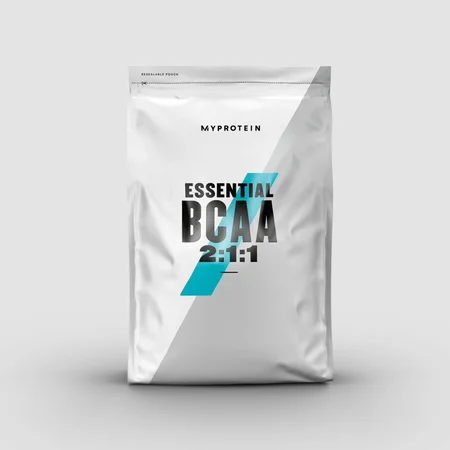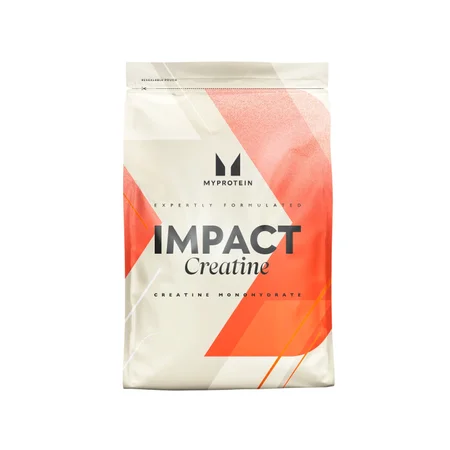Can You Take Creatine & BCAAs Together?

BCAAs and creatine are popular for good reason.
They’re both supplements known for their important roles in supporting muscle growth, performance, recovery, and much more. But can you mix creatine and BCAAs together?
Get ready to find out everything you need to know about using BCAAs and creatine to their full potential.
- The basics of creatine & BCAAs
- How to use creatine
- How to use BCAAs
- Can you mix creatine & BCAAs together?
- Benefits of taking creatine & BCAAs together
- Popular creatine & BCAA combinations
- FAQs
The basics of creatine and BCAAs
What is creatine?
Creatine is a protein made within our body and is found naturally within our muscles.
It’s made from three amino acids; arginine, glycine, and methionine, but it is also found in meat and fish, or can be taken as a supplement.
The cells in our body use Adenosine triphosphate — but we’ll just call it ATP — as a source of energy, and creatine helps to provide energy within the muscles too.
When it comes to exercise, the muscles have a small amount of ATP within them and this is used for explosive movements, such as sprinting, weight-lifting, and other high intensity bouts of exercise.
Creatine has been shown to support improvements in strength, enhance muscle mass growth, and also improve sprint performance.
Improving exercise recovery is another string to creatine’s bow as it can reduce muscle damage (1) and encourage greater glycogen replenishment than just carbohydrates alone (2), which is beneficial for endurance athletes.
Creatine has been extensively studied and has benefits beyond those that are sports-related, such as improved cognitive function (3, 4).

Strength Increases By 30% In 30 Days For Creatine Newbie
Her results didn't disappoint.
What are BCAAs?
Branched chain amino acids, known as BCAAs, are a group of amino acids and they account for over one third of the protein in the body’s muscles (5).
Leucine, isoleucine, and valine are the three BCAAS, and their unique structure is what gives this group the name ‘branched chain’.
These are essential amino acids, so they must be obtained through food or a supplement.
Leucine, isoleucine, and valine are considered the most anabolic of the nine essential amino acids (6), which means that they promote muscle building.
There are 20 amino acids that make up muscle protein, but 9 of these are considered essential.

Essential amino acids are the amino acids that we cannot make within our bodies and so they must be obtained from food.
BCAAs are found in most protein-based foods such as chicken, meat, milk, other dairy products, and of course whey.
They can also be consumed as a supplement, and because they’re widely found in food, a supplement is considered safe.
There are benefits associated with BCAAs, but these were found when BCAAs were supplemented, meaning a higher quantity of BCAAs than simply what can be achieved in the diet is required.
Non-essential amino acids can be made in the body and play a role in muscle growth and repair too. For example, glutamine supports protein synthesis, and is required for the formation of other amino acids, like proline.
Glutamine is a non-essential amino acid that the body is only able to make in small amounts, so we must get some from our diet or through supplements (7).
The harder your muscles work, the more l-glutamine you require, which makes it a conditionally essential amino acid, meaning that there are times when it's necessary to consume more than what our body produces.
How to use creatine
Supplementing with creatine increases the stores of creatine within the muscles which can help to regenerate ATP, and in turn, can increase the capacity for high-intensity movements.
Creatine can be obtained through meat. However, the amount of creatine that could be consumed through food is not sufficient enough to increase muscle creatine concentrations to the point where you would see the benefits that have been illustrated in studies.
Creatine can be taken in supplement form as a powder or a tablet and the current recommendations are to take 3-5g of creatine per day (8).
Continuous supplementation can increase the amount of creatine in muscles by 20-40% (9), which can lead to a greater ability to perform at a higher intensity and recover quicker which will support strength, performance, and muscle mass gain over time.

How to use BCAAs
BCAA’s can be incorporated multiple times during the day if you’re training intensely, and can be used before, during, or after your workout depending on your goals.
When it comes to muscle building, the rate of muscle protein synthesis needs to be higher than the rate of muscle protein breakdown.
A BCAA supplement may help to increase overall intake of amino acids, which can in turn promote this muscle growth.
One study found a 22% greater increase in muscle protein synthesis with BCAA supplementation in comparison to a placebo (10).
Because BCAAs can promote muscle growth and repair, it is thought they can reduce delayed onset muscle soreness, or DOMS.
A recent meta-analysis of studies identified that 7 out of 10 studies demonstrated a reduction in DOMS in trained individuals (11).
The results seen in studies where BCAAs do reduce muscle soreness may be attributable to the fact that the consumption of protein prior to a workout can increase the amount of amino acids in the amino acid pool within the muscles, which can help to reduce the amount of muscle protein breakdown throughout a session.
In a calorie deficit, there’s a greater risk of muscle loss as weight loss is rarely purely fat loss. A recent study demonstrated that BCAA supplementation in individuals who resistance trained and who were in a calorie deficit helped to preserve lean muscle mass and performance while losing fat mass (12).
Similar results were also seen in another study which investigated the impact of BCAA supplementation in wrestlers in a calorie deficit (13).
Can you mix creatine and BCAAs together?
Although they’re two different supplements, creatine and BCAAs can absolutely be mixed together.
In fact, certain supplement blends, like pre- or intra-workouts, combine BCAAs and creatine alongside other components.
Various studies have found there are no concerning adverse effects to your health or performance as a result of mixing the two supplements.
Creatine and BCAAs can be taken at any point in the day, but depending on your goals, you may choose to have BCAAs before, during, or after your training session.
For example, if you’re in a calorie deficit, you may prefer to have BCAA’s before or during your session to help to reduce muscle protein breakdown. However, the timing of taking creatine won’t impact training or performance.

Benefits of taking creatine and BCAAs together
Aside from the fact that taking the supplements together makes it easier to remember, increases the likelihood of adherence, and is convenient, there are benefits to taking them together such as:
Improved performance
Creatine has been shown to support strength and muscle mass gains, as well as enhancing performance in high intensity activities. BCAAs can also help to act as a fuel source.
Reduced muscle protein breakdown
BCAA supplementation may also provide amino acids faster, because they are more readily absorbed than a whole food protein source that has to be digested, which could promote faster recovery and decrease the likelihood of DOMS.
Reduce tiredness
It’s been suggested BCAA supplementation can reduce muscle soreness, which can then delay the perception of fatigue and time to exhaustion during training (14).
Other studies have found increased BCAAs in the bloodstream can influence the levels of neurotransmitters within the brain, potentially reducing the production of serotonin, which plays a role in fatigue during exercise (15, 16).
Ratio of creatine and BCAAs for your own pre-workout blend
Combine your daily dose of creatine with one serving of BCAAs as part of your pre- or intra-workout stack.
Can you mix creatine and glutamine together?
Creatine and glutamine can absolutely be mixed together.
Glutamine has similar benefits to BCAAs. Glutamine has been shown to decrease muscle soreness, support faster recovery, and can also help to replenish energy stores in muscles which benefits performance in subsequent sessions (17, 18).
You can mix creatine and glutamine too.

Popular Creatine and BCAA combinations
Pre-workout
You might think pre-workout is all about providing a hit of caffeine, but there are many beneficial ingredients included in blends such as this one.
Some pre-workouts contain creatine alongside different amino acids like tyrosine. You can mix BCAA’s with your pre-workout, or have your pre-workout 30 minutes before your session and have your BCAAs during.
EAAs
As the name suggests, EAA supplements provide a concentrated source of all of the essential amino acids.
One study found that the benefits of EAAs are greater when provided in an intact source rather than through EAA supplements alone (19). However, a more recent study has suggested that an EAA supplement may be more beneficial over a protein supplement as the amino acids can be absorbed quicker (20).
Similar to BCAAs, you can combine EAA s with creatine.
Whey
Whey protein already contains all the essential amino acids required and a serving provides the ideal quantities to stimulate muscle protein synthesis, so no need to add BCAAs here.
However, adding creatine to your protein shake can help to support your efforts in the gym and your recovery.
L-glutamine
5g of L-glutamine can be added to a shake or water, and it can be taken before, during, or after exercise, and can be added to BCAAs and creatine.
FAQs about creatine and BCAAs
Will stacking creatine and BCAAs guarantee faster results?
In short, no. Supplements should be seen as the icing on the cake.
Creatine and BCAAs can enhance muscle building and performance-related goals, but sleep, diet, and training are fundamental.
Should I combine creatine and BCAAs every time I exercise?
Creatine should be taken daily in different quantities depending on if you’re loading or maintaining.
While BCAAs carry many benefits, there are times where they are more beneficial such as during a calorie deficit. Your goal will dictate whether you need them daily.
What should I avoid taking when having creatine and BCAAs together?
Creatine and BCAA supplements are safe to take together.
Be mindful of other supplements that you are taking that may already include a blend of nutrients (e.g. pre-workout, intra-workout, or recovery blends) and allow you to consume more creatine or BCAAs than necessary.
Take home message
You can combine the two supplements for ease, or may choose to take them separately.
BCAAs are usually used pre- or intra-workout to reduce muscle protein breakdown, whereas creatine stores are built up over time and the timing isn’t something to get too caught up on; daily supplementation is most important.
READ THESE NEXT:

The Best Time To Take Creatine | Before Or After A Workout?
Discover the best time to supplement for the best results.

- Cooke, M. B., Rybalka, E., Williams, A. D., Cribb, P. J., & Hayes, A. (2009). Creatine supplementation enhances muscle force recovery after eccentrically-induced muscle damage in healthy individuals. Journal of the International Society of Sports Nutrition, 6(1), 13
- Nelson, A. G., Arnall, D. A., Kokkonen, J. O. K. E., Day, Randy., & Evans, Jared. (2001). Muscle glycogen supercompensation is enhanced by prior creatine supplementation. Medicine and science in sports and exercise, 33(7), 1096-1100.
- McMorris, T., Mielcarz, G., Harris, R. C., Swain, J. P., & Howard, A. (2007). Creatine supplementation and cognitive performance in elderly individuals. Neuropsychology, development, and cognition. Section B, Aging, neuropsychology and cognition, 14(5), 517–528. https://doi.org/10.1080/13825580600788100
- Smith, R. N., Agharkar, A. S., & Gonzales, E. B. (2014). A review of creatine supplementation in age-related diseases: more than a supplement for athletes. F1000Research, 3.
- Shimomura, Y., Murakami, T., Nakai, N., Nagasaki, M., & Harris, R. A. (2004). Exercise promotes BCAA catabolism: effects of BCAA supplementation on skeletal muscle during exercise. The Journal of nutrition, 134(6 Suppl), 1583S–1587S. https://doi.org/10.1093/jn/134.6.1583S
- Kamal Patel. (2022). Branched-Chain Amino Acids. Retrieved from; https://examine.com/supplements/branched-chain-amino-acids/research/#sources-and-composition-1_aQNnNQq-formulations-and-variants-1
- National Center for Biotechnology Information (2021). PubChem Compound Summary for CID 5961, Glutamine. Retrieved October 11, 2021 from https://pubchem.ncbi.nlm.nih.gov/compound/Glutamine.
- Antonio, J., Candow, D. G., Forbes, S. C., Gualano, B., Jagim, A. R., Kreider, R. B., … & Ziegenfuss, T. N. (2021). Common questions and misconceptions about creatine supplementation: what does the scientific evidence really show?. Journal of the International Society of Sports Nutrition, 18(1), 13.
- Kreider, R. B., Kalman, D. S., Antonio, J., Ziegenfuss, T. N., Wildman, R., Collins, R., … & Lopez, H. L. (2017). International Society of Sports Nutrition position stand: safety and efficacy of creatine supplementation in exercise, sport, and medicine. Journal of the International Society of Sports Nutrition, 14(1), 18.
- Jackman, S. R., Witard, O. C., Philp, A., Wallis, G. A., Baar, K., & Tipton, K. D. (2017). Branched-Chain Amino Acid Ingestion Stimulates Muscle Myofibrillar Protein Synthesis following Resistance Exercise in Humans. Frontiers in physiology, 8, 390. https://doi.org/10.3389/fphys.2017.00390
- Weber, M. G., Dias, S. S., de Angelis, T. R., Fernandes, E. V., Bernardes, A. G., Milanez, V. F., … & de Paula Ramos, S. (2021). The use of BCAA to decrease delayed-onset muscle soreness after a single bout of exercise: a systematic review and meta-analysis. Amino acids, 53(11), 1663-1678.
- Dudgeon, W. D., Kelley, E. P., & Scheett, T. P. (2016). In a single-blind, matched group design: branched-chain amino acid supplementation and resistance training maintains lean body mass during a caloric restricted diet. Journal of the International Society of Sports Nutrition, 13(1), 1.
- Mourier, A., Gautier, J. F., Kerviler, E. D., Bigard, A. X., Villette, J. M., Garnier, J. P., … & Cathelineau, G. (1997). Mobilization of visceral adipose tissue related to the improvement in insulin sensitivity in response to physical training in NIDDM: effects of branched-chain amino acid supplements. Diabetes care, 20(3), 385-391.
- Smith, J. E., Garbutt, G., Lopes, P., & Pedoe, D. T. (2004). Effects of prolonged strenuous exercise (marathon running) on biochemical and haematological markers used in the investigation of patients in the emergency department. British journal of sports medicine, 38(3), 292-294.
- Holeček M. (2018). Branched-chain amino acids in health and disease: metabolism, alterations in blood plasma, and as supplements. Nutrition & metabolism, 15, 33. https://doi.org/10.1186/s12986-018-0271-1
- Cordeiro LMS, Rabelo PCR, Moraes MM, et al. Physical exercise-induced fatigue: the role of serotonergic and dopaminergic systems. Braz J Med Biol Res. 2017;50(12):e6432. Published 2017 Oct 19. doi:10.1590/1414-431X20176432)
- Legault, Z., Bagnall, N., & Kimmerly, D. S. (2015). The influence of oral L-glutamine supplementation on muscle strength recovery and soreness following unilateral knee extension eccentric exercise. International journal of sport nutrition and exercise metabolism, 25(5), 417-426.
- Iwashita, S., Williams, P., Jabbour, K., Ueda, T., Kobayashi, H., Baier, S., & Flakoll, P. J. (2005). The impact of glutamine supplementation on glucose homeostasis during and after exercise. Journal of applied physiology.
- Katsanos, C. S., Chinkes, D. L., Paddon-Jones, D., Zhang, X. J., Aarsland, A., & Wolfe, R. R. (2008). Whey protein ingestion in elderly persons results in greater muscle protein accrual than ingestion of its constituent essential amino acid content. Nutrition research, 28(10), 651-658.
- Weijzen, M. E. G., van Gassel, R. J. J., Kouw, I. W. K., Trommelen, J., Gorissen, S. H. M., van Kranenburg, J., Goessens, J. P. B., van de Poll, M. C. G., Verdijk, L. B., & van Loon, L. J. C. (2022). Ingestion of Free Amino Acids Compared with an Equivalent Amount of Intact Protein Results in More Rapid Amino Acid Absorption and Greater Postprandial Plasma Amino Acid Availability Without Affecting Muscle Protein Synthesis Rates in Young Adults in a Double-Blind Randomized Trial. The Journal of nutrition, 152(1), 59–67. https://doi.org/10.1093/jn/nxab305










